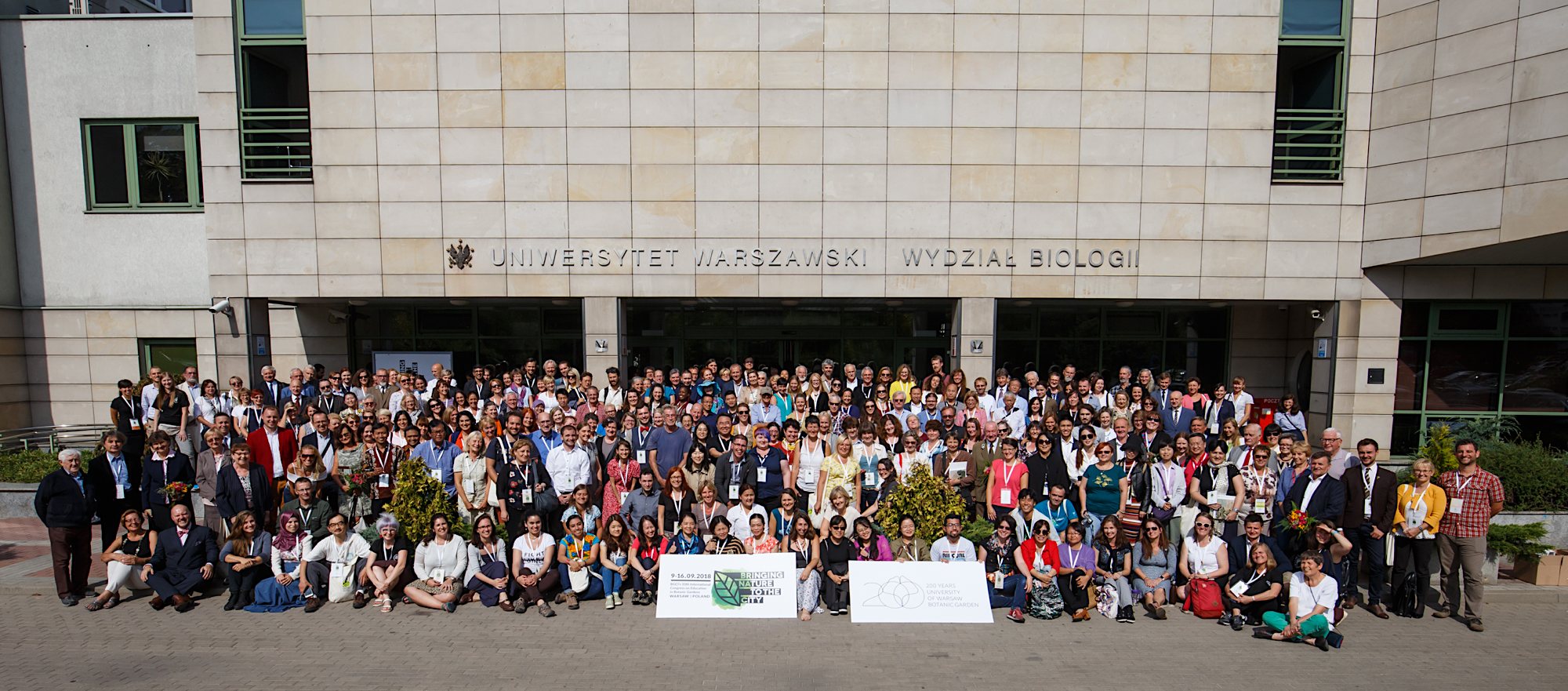10th Education Congress - Bringing Nature to the City
-
Country
Poland -
Region
Global -
Topic
Public Engagement -
Type
News -
Source
BGCI
BGCI’s 10th International Congress on Education in Botanic Gardens was held between 10th and 14th September 2018 and hosted by the University of Warsaw Botanic Garden. The event was a great success with ~300 registered delegates from 50 countries.

The week saw 65 posters and 65 sessions focusing on the congress’ themes:
- City Gardens – City gardens all over the world have much in common. What do they offer to their audiences? What kind of difficulties do they face, what is specific for such gardens and how do they answer the challenges and advantages of their location in educational programmes?
- New Educational Tools – This session is dedicated to practical tools and solutions used in education in botanic gardens – from inexpensive homemade tools to more sophisticated technologies used in education and its evaluation. Presentations should be focused on the design of the tools which might be copied in other gardens
- Working Together – Challenges can often arise from the presence of and interaction between different groups of employees within the garden (gardeners, curators, educators, etc.) who may have different backgrounds, perspectives and priorities for their work. This session is dedicated to sharing good practice on developing cooperation and problem solving, with the aim of realizing a garden’s mission and ensuring the support and involvement of staff of the garden within educational initiatives. In addition this session will also look at how gardens work outside of their own organisation, building networks to support their work. Botanic gardens have great potential for linking people and organizations – acting as important hubs in the vicinity but there are important challenges that need to be addressed to successfully achieve this.
- Supporting Formal Education – How do botanic gardens work with partners that represent formal education systems (schools, teachers etc.)? Do they influence curricula and governmental educational polices? This session is focused on nature based tools, methods, inspirations and innovations in the field of formal education.
- Reaching New Audiences – This session focuses on the importance of reaching new audiences and will share case studies of projects that aimed to develop relationships with new audiences, discussing successes and lessons learnt. This will include new and creative ways of working with new audiences, effective ways to reach audiences and important lessons from less successful projects. This session will also look at why some audiences are harder to reach for the botanic garden sector.
- Measuring Impact – Objective 4 of the Global Strategy for Plant Conservation asks that “Education and awareness of plant diversity, its role in sustainable livelihoods and importance to all life on earth is promoted”. The education and public engagement work of botanic gardens should aim to address this objective as well as the Aichi biodiversity targets (specifically target 1) and the Sustainable Development Goals (primarily 4, 11, 12, 13 and 15). But how do we know if we are meeting these aims, what is the impact of the education work that is being delivered and how is this contributing to key issues such as sustainability, climate change and biodiversity conservation? This session will explore the work of educators to address these targets and focus on the ways in which impact can be measured.
- Education in Polish Botanic Gardens – The session is dedicated to the challenges Polish botanic gardens face in their educational activity. The session will be held in Polish.
- Celebrating the 200th anniversary of the University of Warsaw Botanic Garden – A special session to celebrate 200 anniversary of University of Warsaw Botanic Garden will also be held during the Congress.
Closing remarks
From these sessions the following recommendations were given in the closing remarks:
- To remain relevant, the botanic garden sector needs to talk to formal education providers about how we can support their needs and adapt to their curricula, where necessary.
Carefully considered use of technology can support botanic gardens to widen our reach. - Botanic gardens need to be advocates of science.
- It is important that we understand our visitors and their experiences, supporting their social needs will lead to conservation behaviours and galvanize our efforts.
- Collaboration is key! We can’t do it alone!
- SDG challenge for the BGCI network: Botanic gardens need to develop actions and strategies that direct us towards the Sustainable Development Goals.
- BGCI must support gardens to do this.
- The importance of plant diversity and the need for its conservation incorporated into communication, education and public awareness programmes.
- This week’s discussion moves us towards this goal. But, the GSPC notes that: “Due to a lack of baseline information, progress towards this target is difficult to measure on a global scale.” Highlights an important message from this Congress. We need to think strategically!
- The Botanic garden sector needs to think about our direction and our impacts, to do this every organisation should have an impact statement.
Scholarships
Gold Sponsor Scholarship
BGCI was delighted to be able to offer scholarships to support delegates to participate in the 10th International Congress on Education in Botanic Gardens. This funding was made possible through support from our Gold sponsors: Morton Arboretum, Naples Botanical Garden and Missouri Botanical Garden.
University of Warsaw Botanic Garden registration fee scholarships
The Univesity of Warsaw Botanic Garden supported a small number of delegates from Central and Eastern European states.
Sylvia Scholarship Fund
BGCI was delighted to be able to offer scholarships to support delegates to participate in the 10th International Congress on Education in Botanic Gardens. This funding has been made possible through the Sylvia Scholarship Fund.
The 10th International Congress on Education in Botanic Gardens was sponsored by: